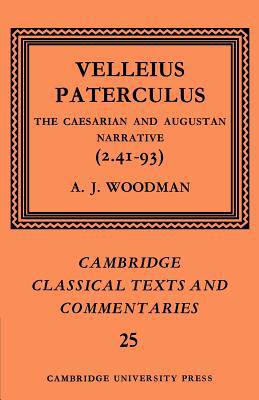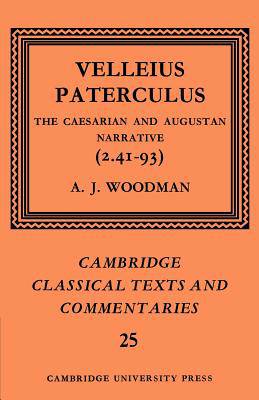
- Afhalen na 1 uur in een winkel met voorraad
- Gratis thuislevering in België vanaf € 30
- Ruim aanbod met 7 miljoen producten
- Afhalen na 1 uur in een winkel met voorraad
- Gratis thuislevering in België vanaf € 30
- Ruim aanbod met 7 miljoen producten
Zoeken
€ 117,95
+ 235 punten
Omschrijving
The first volume of Professor Woodman's edition of, and commentary on, Velleius Paterculus was published in the Cambridge Classical Texts and Commentaries series in 1977. This is the second volume to appear, covering Velleius' narrative of Julius Caesar and Augustus, down to 19 B.C. Velleius' history was first published in A. D. 30 and is being increasingly regarded as an important source for Roman history. Professor Woodman's aims have been the same as in his first volume: to establish the text, or at least to indicate where it is unreliable, and to explain the nature and meaning of the narrative. Thus his commentary is primarily textual, linguistic and stylistic, to be used by those who want to read Velleius, whether their interests are literary, historiographical or historical. It is the first commentary of its scale and scope since the beginning of the nineteenth century.
Specificaties
Betrokkenen
- Auteur(s):
- Uitgeverij:
Inhoud
- Aantal bladzijden:
- 316
- Taal:
- Engels
- Reeks:
- Reeksnummer:
- nr. 25
Eigenschappen
- Productcode (EAN):
- 9780521607025
- Verschijningsdatum:
- 10/06/2004
- Uitvoering:
- Paperback
- Formaat:
- Trade paperback (VS)
- Afmetingen:
- 144 mm x 215 mm
- Gewicht:
- 417 g

Alleen bij Standaard Boekhandel
+ 235 punten op je klantenkaart van Standaard Boekhandel
Beoordelingen
We publiceren alleen reviews die voldoen aan de voorwaarden voor reviews. Bekijk onze voorwaarden voor reviews.











